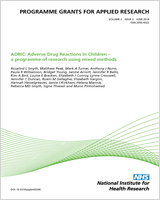Included under terms of UK Non-commercial Government License.
NCBI Bookshelf. A service of the National Library of Medicine, National Institutes of Health.
Heller S, Lawton J, Amiel S, et al. Improving management of type 1 diabetes in the UK: the Dose Adjustment For Normal Eating (DAFNE) programme as a research test-bed. A mixed-method analysis of the barriers to and facilitators of successful diabetes self-management, a health economic analysis, a cluster randomised controlled trial of different models of delivery of an educational intervention and the potential of insulin pumps and additional educator input to improve outcomes. Southampton (UK): NIHR Journals Library; 2014 Dec. (Programme Grants for Applied Research, No. 2.5.)

Improving management of type 1 diabetes in the UK: the Dose Adjustment For Normal Eating (DAFNE) programme as a research test-bed. A mixed-method analysis of the barriers to and facilitators of successful diabetes self-management, a health economic analysis, a cluster randomised controlled trial of different models of delivery of an educational intervention and the potential of insulin pumps and additional educator input to improve outcomes.
Show details- BGAT
Blood Glucose Awareness Training
- BMI
body mass index
- CGM
continuous glucose monitoring
- CI
confidence interval
- CICS
Corporate Information and Computing Services
- CIDS
Confidence in Diabetes Self-Care
- CP
carbohydrate portion
- CSII
continuous subcutaneous insulin infusion
- CVD
cardiovascular disease
- DAFNE
Dose Adjustment For Normal Eating
- DAFNE 5 × 1 day
randomised controlled trial of DAFNE training delivered for 5 continuous days over 1 week vs. DAFNE training delivered for 1 day per week for 5 continuous weeks
- DAFNE-HART
Dose Adjustment For Normal Eating Hypoglycaemia Awareness Restoration Training
- DCCT
Diabetes Control and Complications Trial
- df
degrees of freedom
- DIG-AMI
Diabetes mellitus Insulin-Glucose Infusion in Acute Myocardial Infarction
- DKA
diabetic ketoacidosis
- DSQOLS
Diabetes-Specific Quality of Life Scale
- DUAG
Dose Adjustment For Normal Eating Users Action Group
- DUG
Dose Adjustment For Normal Eating User Group
- EDIC
Epidemiology of Diabetes Interventions and Complications
- eGFR
estimated glomerular filtration rate
- EQ-5D
European Quality of Life-5 Dimensions
- EQ VAS
European Quality Visual Analogue Scale
- ESRD
end-stage renal disease
- FIIT
flexible intensive insulin therapy
- GEE
generalised estimating equation
- GP
general practitioner
- HADS
Hospital Anxiety and Depression Scale
- HADS-A
Hospital Anxiety and Depression Scale – anxiety
- HADS-D
Hospital Anxiety and Depression Scale – depression
- HbA1c
glycated haemoglobin
- HDL
high-density lipoprotein
- HFS-W
Hypoglycaemia Fear Survey Worry subscale
- HTA
Health Technology Assessment
- ICC
intracluster correlation coefficient
- ICER
Incremental cost-effectiveness ratio
- ITT
intention to treat
- ITTP
Insulin Treatment and Training Programme
- LDL
low-density lipoprotein
- MDI
multidose injection (insulin)
- MI
myocardial infarction
- NICE
National Institute for Health and Care Excellence
- NIHR
National Institute for Health Research
- NPH
neutral protamine Hagedorn
- NTCRN
North Trent Cancer Research Network
- OLS
ordinary least square
- PAID
Problem Areas in Diabetes
- PMD
Personal Models of Diabetes
- PPI
patient and public involvement
- PROM
patient-reported outcome measure
- PSA
probabilistic sensitivity analysis
- QALY
quality-adjusted life-year
- QoL
quality of life
- RCT
randomised controlled trial
- RE-AIM
Reach, Efficacy, Adoption Implementation, Maintenance
- REPOSE
Relative Effectiveness of Pumps Over MDI and Structured Education
- RfPB
Research for Patient Benefit
- RQ
research question
- ScHARR
School of Health and Related Research
- SCI-R
Self-Care Inventory – Revised
- SD
standard deviation
- SF-6D
Short Form questionnaire-6 Dimensions
- SF-12
Short Form questionnaire-12 items
- SF-36
Short Form questionnaire-36 items
- SMBG
self-monitoring of blood glucose
- SMQ
self-management questionnaire
- SSQ6
6-item Social Support Questionnaire
- UKPDS
UK Prospective Diabetes Study
- WESDR
Wisconsin Epidemiology Study of Diabetic Retinopathy
- WHO-5
World Health Organization 5-item questionnaire
- WTE
whole-time equivalent
- List of abbreviations - Improving management of type 1 diabetes in the UK: the D...List of abbreviations - Improving management of type 1 diabetes in the UK: the Dose Adjustment For Normal Eating (DAFNE) programme as a research test-bed. A mixed-method analysis of the barriers to and facilitators of successful diabetes self-management, a health economic analysis, a cluster randomised controlled trial of different models of delivery of an educational intervention and the potential of insulin pumps and additional educator input to improve outcomes
Your browsing activity is empty.
Activity recording is turned off.
See more...